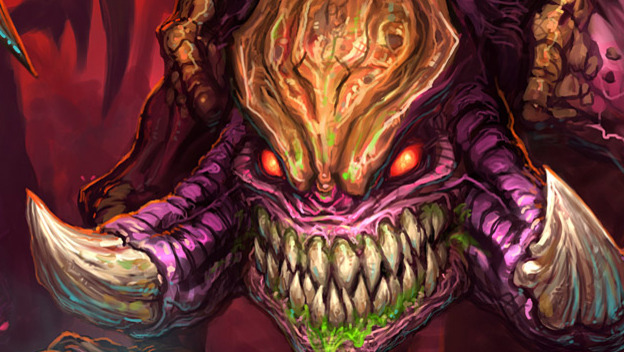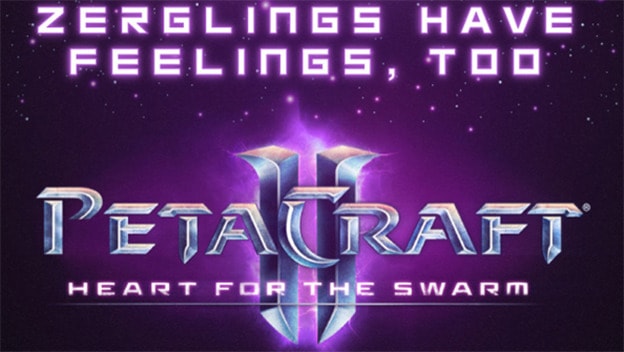Oh PETA, you’ve done it again; you’ve successfully made both my brain and my sides hurt with your indefensible shenanigans. Only this time, you’ve actually brought up a good point—though I’m sure it was completely accidental. I’d sooner expect console fanboys to be right about video games than you, though you are doing slightly better than the NRA in that regard— just ask Josh Engen .
I’m guessing some of you have no idea what I’m talking about. Luckily, PETA’s Joel Bartlett has the answers for you . I’m talking about PETA’s, or should I say TETZ’s (“Terrans for the Ethical Treatment of Zerglings”), recent proclamation to defend the Zerglings in StarCraft II: Heart of the Swarm on the grounds that, as Bartlett puts it, “while Zerglings are not real, there are many equally ‘strange’ and exotic animals we share this planet with who deserve our empathy.” They acted on this statement by handing out fliers and promotional paraphernalia to midnight-launch gamers in Irvine, California, which surely proved to be a bounty of perfectly credible information. Seriously, I’m sure a video game-inspired “PETA parody” makes way more sense than their usual agenda.
I’ll spare you the debate regarding animal treatment. Instead, let’s look at the more relevant topic: publicity and distribution in video games and what advertisements like these say about the gaming industry.
You could say that PETA is once again defending animals (I suppose that’s one term for the Zerg), albeit satirically so. But it’s more accurate (and much easier) to say that their using the popularity of video games—namely the enormous fan base surrounding StarCraft—to get attention. This is something we’ve seen in increasing amounts in recent years (again, I’m pointing at the NRA), and it’s not the first time PETA has done it. A similar situation arose around the launch of Pokémon Black/White, which was paired with the release of PETA’s parody game Pokémon: Black and Blue.
Some gamers may say that this sort of parasitic advertising is annoying and deplorable. But when you brush the opinionated nonsense aside, you’ll see several gains for the video game industry.
In one way or another, PETA has successfully exposed StarCraft II to millions of people who may or may not have been aware of it beforehand. Better still, Blizzard gained this sizeable chunk of potential customers without spending a dime; PETA promoted the product of their own free will. Obviously, I don’t expect all three million members to run out and buy the game, but the aforementioned fliers and protests, as well as the customary blogs and social networking, will get the game some serious limelight.
Wait a minute. Inadvertently profiting off of free publicity rather than directly from revenue? Why does that sound so familiar? Oh, that’s right; it echoes the used game market perfectly.
The used game industry has been a hot topic among gamers for months now, ever since Sony’s RF-tag scare regarding secondhand sales. That served as the catalyst to a host of dread and speculation surrounding the future of gaming, particularlyfor the coming generation of consoles—most of which was completely unjustified. Sony never actually claimed to intend to use the patent to derail the used game market, after all. They just had their finger on the metaphorical red button.
And to the relief of the bargain-hunting gamer population, that button was never pushed. This truly isn’t that surprising since dissolving the sale of used games and their retailers (GameStop, Amazon, EBay, etc.) would not only be incredibly difficult, but completely self-destructive. Consequently, so is making all games download-only, because every physical copy sitting on a shelf in a public store is attracting the eye of every customer that walks by it.
The biggest argument against used games—one rarely heard from anyone other than producers—is that creators are missing out on the revenue that they would gain from a purchase of the new version of the game. However, the attention to be gained at the hands of what can safely be called inevitable advertising will far outweigh the 30% price gap. Perhaps not for monthly profit statements, but for the reputations of the developer, publisher, and respective console-maker, this scenario is far more valuable than that unit’s sale.

And there’s yet another upside to this shallow exploitation. Video games are an enormous and growing industry, yes, but they have yet to secure a spot in the entertainment market as a wholly credible medium. Compared to the titans of movies and television, they’re still the black sheep in the corner. Well, the fact that large organizations are targeting them as a means of gaining exposure enforces their reputation as just that: a wholly credible medium. It wouldn’t be worth jumping on the StarCraft bandwagon to promote your ideas if millions of people weren’t following it, now would it?
So, interestingly enough, ridiculous gimmickry like PETA’s “Heart For the Swarm” campaign is fundamentally beneficial. And hilarious. In fact, advertising around video games will likely prove to be a promising element for the future. Let’s just hope we don’t see junk food logos plastered over inFamous: Second Son. Halo 4 was victim enough.
| By Austin Wood Freelance Writer Date: March 18, 2013 |
